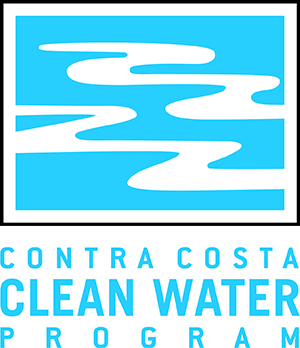About Us
The Contra Costa Clean Water Program (CCCWP) assists its member agencies to implement stormwater quality activities in compliance with state and Federal mandates.
Who We Are:
CCCWP comprises Contra Costa County, the cities of Antioch, Brentwood, Clayton, Concord, El Cerrito, Hercules, Lafayette, Martinez, Oakley, Orinda, Pinole, Pittsburg, Pleasant Hill, Richmond, San Pablo, San Ramon and Walnut Creek, the towns of Danville and Moraga, and the Contra Costa County Flood Control and Water Conservation District. These jurisdictions comprise all incorporated and unincorporated areas within Contra Costa County. The agencies are named as Permittees in the Municipal Regional Stormwater Permit (MRP) issued by the California Regional Water Quality Control Board for the San Francisco Bay Region (RWQCB).
What We Do:
Each of the 21 local government agencies owns and operates a Municipal Separate Storm Sewer System (MS4). MS4s carry stormwater runoff from roofs and pavement directly to creeks, wetlands, and the Bay/Delta without any treatment to remove trash and pollutants. Stormwater pollution prevention includes:
- Preventing anything except stormwater runoff from entering the MS4, and
- Implementing Best Management Practices (BMPs) that reduce, to the maximum extent practicable, pollutants entering stormwater runoff.
Here are some examples of MRP-mandated local activities:
- Implementing BMPs when washing or renovating paved areas, repainting, or removing graffiti.
- Practicing good housekeeping at corporation yards and other facilities.
- Requiring land development projects (public and private) to incorporate Low Impact Development (LID) features and facilities that reduce runoff pollution over the life of the project.
- Preparing and implementing a Green Infrastructure Plan to retrofit public streets and storm drains with LID features and facilities.
- Using Integrated Pest Management (IPM) to minimize use of pesticides.
- Inspecting industrial and commercial businesses, and construction sites, and requiring that they implement appropriate BMPs.
- Preventing the illicit discharge of washwater, pool water, trash, and other wastes to the MS4, including enforcement.
- Educating and involving the public through outreach, school-based education, and cleanup events.
- Installing and maintaining trash capture devices in storm drain systems.
- Requiring certain building demolition projects to manage wastes that may include PCBs.
To support its member agencies' implementation of local stormwater pollution prevention activities, CCCWP convenes, facilitates, and supports countywide committees, made up of local agency staff, to develop and improve BMPs, to provide guidance and training, and to troubleshoot implementation.
The committees recommend and prioritize "group activities," which are planned and budgeted by CCCWP and implemented by CCCWP staff and consultants.
CCCWP conducts some MRP-mandated activities on behalf of the Permittees, where it makes sense to implement activities at the countywide level rather than locally. These additional group activities include:
- A countywide phone number to report illicit discharges.
- Outreach via social media.
(Follow us: Instagram: @cccleanwater) | Facebook: @cccleanwaterprogram ) - Support for creek groups and watershed-related organizations, and school-based outreach.
- Point-of-sale outreach for less-toxic alternatives to pesticides.
- Outreach to those fishing in the Bay for consumption.
- Water-quality monitoring in local streams.
CCCWP participates in funding and directing regional and statewide stormwater-related programs and groups such as:
- A Regional Monitoring Program (RMP) implemented by the San Francisco Estuary Institute.
- The Bay Area Stormwater Management Agencies Association (BASMAA, now BAMS Collaborative).
- The California Stormwater Quality Association (CASQA).
CCCWP further assists Permittees to comply with the MRP by:
- Assisting with Annual Reports to the RWQCB, and other reporting of mandated activities.
- Preparing planning and technical reports required by the MRP.
- Participating in and providing technical support for negotiation of permit conditions (on a 5-year reissuance cycle).
- Maintaining a Geographic Information System (GIS) to support tracking and reporting of mandated activities.
- Participating in countywide meetings with local planning directors, public works directors and engineers, and public agency managers.
How We Operate:
The roles and responsibilities of CCCWP and its 21 member agencies are outlined in a Program Agreement (PDF), initiated in 1991 and most recently updated in 2010. The Program Manager directs staff and acts under the direction of a Management Committee made up of one representative from each member agency.
CCCWP staff are employees of Contra Costa County. CCCWP offices are located within the County's Public Works Division. The County acts as CCCWP's fiscal agent.
CCCWP's operating costs are allocated to the member agencies by population. Parcels in the County, except those the cities of Richmond and Brentwood, are subject to a Stormwater Utility Assessment (SUA) authorized by a 1992 amendment to Contra Costa County Flood Control and Water Conservation District Act. The annual SUA amount is set by the local governing body. The funds are administered by the District. Based on the annual budget adopted by the Management Committee, once SUA revenues are collected, the amount allocable to each jurisdiction's parcels is determined. From this amount, the local entity's share of CCCWP costs is retained for CCCWP's use and the remainder (72% - 86% of the total, depending on locality) is distributed to the local government entity for the implementation of local stormwater pollution prevention activities. Richmond and Brentwood pay their share of CCCWP's operating costs from other local sources.


